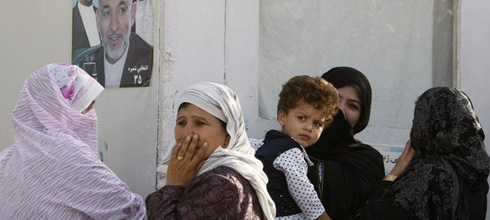
Afghan Poll Workers Ambushed; US Soldiers Killed
Hamid Shalizi - Reuters
Kabul - A convoy of campaign workers for Afghan President Hamid Karzai was ambushed five times on Saturday, officials said, as Taliban insurgents step up efforts to disrupt the presidential election.
The U.S. military also said three U.S. troops were killed in the south, while a French soldier died and two were wounded in fighting in Kapisa province in the east, French officials said.
The Taliban this week vowed to disrupt the Aug 20. presidential election and called on Afghans to boycott it.
Violence had already reached its highest level since the Taliban were toppled in 2001 and then escalated after the launch of military offensives in southern Helmand province.
Civilians and security forces have been killed at record rates in recent weeks, with attacks by insurgents now also focusing on election candidates and officials.
Fazel Ahmad, a campaign worker for Karzai, said the convoy was attacked by Taliban insurgents five times as it drove back to Kabul from Ghazni in the southeast. One security guard was killed, he said.
Juma Gul, a candidate for Ghazni provincial elections, and another security guard were wounded, Ahmad said.
Karzai was not in the convoy and was campaigning in northern Baghlan province at the time of the attack.
"We were ambushed by insurgents five times in Ghazni but fortunately we have few casualties," Ahmad told Reuters.
"They were well-planned attacks but we managed to escape."
Ghazni chief Khial Baz Sherzai said the campaign workers had not told police they would be in the area but police later responded, killing five Taliban and wounding six.
Offices Bombed
It was the fourth ambush of a candidate or campaign official in little more than a week, although no national candidates have been seriously wounded.
Among those attacked were Karzai's vice-presidential running mate Mohammad Qasim Fahim.
Several campaign offices have also been bombed, with most of the attacks blamed on the Taliban.
Former foreign minister Abdullah Abdullah, one of few serious challengers to Karzai among a field of 36 contenders, said he was concerned by the number of election-related attacks.
"It is the government's duty to provide proper security for the election campaign but, unfortunately, they have absolutely failed to do so," Abdullah told reporters in his Kabul office.
International and Afghan analysts and observers have said continued, widespread violence could lead to either poor voter turn-out or widespread fraud in the voting.
Karzai remains a clear front-runner ahead of Abdullah and former finance minister Ashraf Ghani. Poor security or a vote fractured across the wide field appear Karzai's biggest concerns.
Campaigning in Kayan, Karzai said he would redouble his efforts toward achieving peace if he is re-elected.
"After succeeding through your votes, the start of my first day of work will be to intensify the efforts for peace in this land," Karzai told thousands of supporters in a mountain valley.
On Monday, Karzai's government said it had struck a ceasefire deal with the Taliban for the election in a remote province in the northwest, the first of its kind.
Senior Taliban leaders however later said there was no ceasefire with the government anywhere in Afghanistan. Three days later the Taliban issued a statement vowing to disrupt the poll and called on Afghans to boycott the vote.
Little information was available about the latest three U.S. military casualties other than they were killed when their patrol was hit by two roadside bombs.
A total of 41 U.S. troops were killed in Afghanistan in July, well above the previous monthly high of 26 in September 2008.
Britain has also suffered its worst battlefield losses in almost a generation, with 22 killed in July.
The heavy losses came after thousands of U.S. Marines and British troops launched operations last month to clear the Taliban from areas of Helmand.
The Helmand operations are the first under U.S. President Barack Obama's new regional strategy to defeat the Taliban and stabilize Afghanistan. The poll is seen as a test of that policy, and of Kabul's ability to hold a credible and legitimate ballot.
